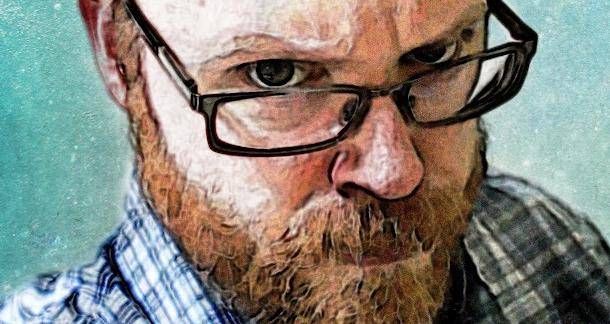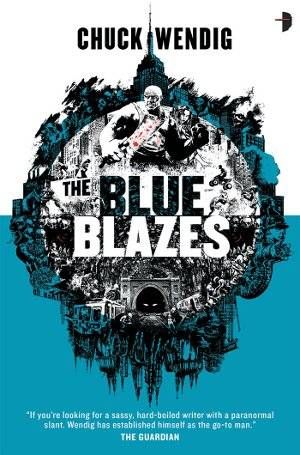
Chuck Wendig Interview | Talking Books With an Expert in the Field
Chuck Wendig is a wordslinger, a penmonkey, a foul-mouthed dispenser of writing advice and a prolific blogger. He has a great number of books out and they are getting attention and quite a bit of positive reviews.
He has so many books out by now that I lost count and his writing advice, doled out by the bucketload on his blog, Terribleminds.com, is always spot-on, whether you are looking for inspiration, some good sensible tips, or just a swift kick in the sensitive area to get you going, with my recent favorite being:
“NO, SERIOUSLY, QUIT WHAT YOU’RE DOING RIGHT NOW AND GO WRITE.”
So I asked this expert in the field a few questions about books. Enjoy.
1. What book are you reading right now, and how did you end up with that particular book (I’m interested in how people discover books).
I’m reading a book called Kingpin by Robert Poulsen. It’s the story of a hacker who ends up running his own criminal empire online through stolen credit card numbers. Fascinating stuff. I’m reading it because I solicited the MAGICAL HIVE-MIND (aka social media) for books on hackers.
2. Name three books that you think everyone in the world should read. Why these books?
Ye gods, everyone? Like, everyone-everyone? Oh, shit. This will break my brain just to pick three, buuuuut, let’s go with: You Are Not So Smart by David McRaney, Homicide by David Simon, Beloved by Toni Morrison.
3. I feel fairly safe in saying that you are a “genre” writer. What do you think of this literary/genre divide?
I think the literary and genre divide is aerosolized horseshit. I think it’s a false wall separating one big room. Proven of course by the fact that you have plenty of writers able to cross over. We have plenty of examples of genre writers who are literary and plenty of examples of literary authors whose works contain elements of genre. I just mentioned Toni Morrison’s Beloved up there and that has genre elements — I mean, in some ways, it’s a horror novel. (It has a ghost! Er, well, maybe!) Margaret Atwood wades even deeper into genre waters with her books.
4. What are your favorite classics? Do you think Dickens, Chekov and Austen are still relevant to the modern, eBook-owning reader?
Favorite classic authors — well, depends on what constitutes a classic, I guess, but I’m a fan of James Joyce. Mark Twain. I love the Brontes (but, heresy, I appreciate but do not care much for Jane Austen). Joseph Conrad. Classics are important because they form the backbone of our reading culture. And they often form the smaller bones of our culture in general. I mean, if you haven’t read Shakespeare, you probably don’t realize how much of our language and how many sayings of ours were born in his work. Also, if you haven’t read Shakespeare, you should probably be put on an island somewhere with all the other bewildered sods, left on the beach with a box of all his plays so you can atone for your grievous sins.
5. You have said that you are a slow reader. Does this mean that you pick your reading material with more care? What does it take for you to stop reading a book?
I am slow as cold honey when it comes to reading. I tend to read more non-fiction than fiction — largely out of necessity. Writers, I think, are better served by reading non-fiction and here’s why: when I read a non-fiction book, I get a flurry of ideas. When I read a fiction book, I get that author’s ideas. Not to say writers shouldn’t read fiction — they must! But non-fiction gives me puzzle pieces to use, where fiction gives me the picture already put together.
As for quitting a book early: I am an extraordinarily fickle author. I put down probably half the books I pick up these days. It doesn’t take much for me to put down a book. Life is short and I’m a picky little monkey.
6. Self-publishing is getting more popular by the day. Have you ever stumbled upon something self-published, by an author you had no previous knowledge of, that you really liked?
I don’t know that I’ve ever stumbled on a self-published book. I’ve read plenty I’ve loved, mind you. But book discovery is pretty wonky these days, and I think self-pub authors are hurt most by that. I mean, very little online helps to simulate the really awesome process of wandering half-drunk into a bookstore and finding a heapin’ helping of new books just by scanning the shelves.
7. You write books about writing, and dole out foul-mouthed advice for writers on your blog. What books, apart from Strunk & White of course, are your go-to writing guides?
Go-to writing guides. It’s obvious to say Stephen King’s On Writing, but you can’t not mention it. I don’t agree with everything in there, but anybody who thinks writing advice is about finding 100% agreeable material doesn’t get it. Any of Lawrence Block’s writing books are golden. Save the Cat by Blake Snyder. Ray Bradbury’s Zen In The Art Of Writing.
 8. Your latest book, Blue Blazes is out now. What books served as inspiration for it? Are there any books that you absolutely had to read for Blue Blazes to exist?
8. Your latest book, Blue Blazes is out now. What books served as inspiration for it? Are there any books that you absolutely had to read for Blue Blazes to exist?
Blue Blazes is out now. *elbows the Internet hard, winks, clucks tongue*
Speaking about classics, obviously Dante’s Inferno forms a nice touchstone — in my book, Mookie Pearl is the dude standing on the thin bloody line between the criminal underworld and the very real monstrous underworld beneath Manhattan’s feet, and to save his people, his daughter and eventually the whole city he’s gotta go down into the “Great Below,” as it’s called, on a quest into the Hell beneath New York City.
One thing I needed wasn’t a book, but a History Channel documentary about the Sandhogs — the guys who basically built the massive subterranean infrastructure of Manhattan. Those guys are awesome. And maybe a little nuts. They figure somewhat prominently in the book, so.
I think Blue Blazes definitely has the vibe of a Kadrey or a Butcher book? Neither author is required reading to read Blue Blazes, to be clear, but are fundamental authors in the urban fantasy genre, methinks.
____________________________
Sign up for our newsletter to have the best of Book Riot delivered straight to your inbox every two weeks. No spam. We promise.
To keep up with Book Riot on a daily basis, follow us on Twitter, like us on Facebook, , and subscribe to the Book Riot podcast in iTunes or via RSS. So much bookish goodness–all day, every day.



 8. Your latest book, Blue Blazes is out now. What books served as inspiration for it? Are there any books that you absolutely had to read for Blue Blazes to exist?
8. Your latest book, Blue Blazes is out now. What books served as inspiration for it? Are there any books that you absolutely had to read for Blue Blazes to exist?












